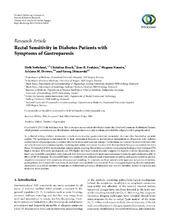Rectal Sensitivity in Diabetes Patients with Symptoms of Gastroparesis
Søfteland, Eirik; Brock, Christina; Frøkjær, Jens B.; Simrén, Magnus; Drewes, Asbjørn M.; Dimcevski, Georg Gjorgji
Peer reviewed, Journal article
Published version

Åpne
Permanent lenke
https://hdl.handle.net/1956/9029Utgivelsesdato
2014-07-22Metadata
Vis full innførselSamlinger
Originalversjon
https://doi.org/10.1155/2014/784841Sammendrag
In a clinical setting, diabetic autonomic complications (cardiac, gastrointestinal, urogenital, etc.) are often handled as separate entities. We investigated rectal sensitivity to heat, mechanical distension, and electrical stimulations in 20 patients with diabetes and symptoms of gastroparesis, to evaluate the extent of visceral neuronal damage. Furthermore, to evaluate the relation between the nervous structures we examined gastric emptying and cardiac autonomic function with the hypothesis being an association between these. We found that 60% of patients had delayed gastric empting. Rectal hyposensitivity was a general finding as they tolerated 67% higher thermal, 42% more mechanical, and 33% higher electrical current intensity compared to healthy controls. In patients, most heart rate variability parameters were reduced; they reported significantly more gastrointestinal symptoms and a reduced quality of life in all SF-36 domains. Shortened RR interval correlated with reduced rectal temperature sensitivity, and gastric retention rate was negatively associated with symptoms of nausea and vomiting. To conclude, in these patients with signs and symptoms of diabetic gastroparesis, rectal sensitivity was reduced, and heart rate variability was impaired. Thus, we suggest regarding diabetic autonomic neuropathy as a diffuse disorder. Symptoms of widespread autonomic dysfunction and sensory disorders should be expected and treated in these patients.
